A recent post was concerned with reader expectations—specifically those of genre readers. That post also discussed the advantages of genre titles for publishers when marketing and selling their product.
But what of the authors at their desks, considering what to write next? There are numerous reasons career authors may consider writing within a genre.
Take me away
Genre fiction can be derided by some as poorly written or escapist. I’d counter that it’s rarely the first, and the second sounds good to me. Certainly, all of us at CareerAuthors have been escaping into fiction from childhood on. And having started my career at Pocket Books—which revolutionized the American publishing industry with the first mass-market paperback books—I’m a great defender and promoter of genre fiction.
Classic
Genre fiction gets to the heart of who we are by exploring universal themes such as love and death. These concerns are at the heart of genres like romance and mystery. Even reality-busting genres like fantasy and sci-fi thrillers satisfy the need to investigate those familiar human urges.
As Bruno Bettelheim wrote in The Uses of Enchantment: The Meaning and Importance of Fairy Tales, “Only a story conforming to the principles underlying our thought processes carries conviction for us.” Or to quote brilliant, bloodthirsty Hannibal Lecter, “We covet what is familiar.”
In genre fiction, not only are the tropes of ancient storytelling often on display, but it’s not hard to find even conscious reworkings of folk tales and mythology. The Winter Sister by Megan Collins uses a haunting mystery about the main character’s murdered sister to bring new life to the myth of Persephone and Hades. Alyssa Coles’s romance novel, A Princess In Theory, the story of an engaging young research scientist trying to use her overly full work and study duties to forget her foster child past, is also an entertaining retelling of Cinderella.
Teeming masses, waiting to read your book
Let’s get practical facts out of the way. According to Statistica, the most popular genre in the U.S. is thriller/mystery/detective; half of the respondents said they read books in this genre in 2015. Romance was next, with 27%. For writers seeking a wide audience, here is your opportunity. At this moment, readers are eagerly awaiting more books in their preferred genre.
Like-minded folks
Genre writers form communities. These can be invaluable for authors when learning how to sell and promote their books. There is so much useful information available to the membership of groups like the Horror Writers Association or Romance Writers of America or Crime Writers of Color.
Further, there’s great camaraderie among like-minded purveyors of craft. These genre-focussed literary groups may be more open to new writers than others in groups with a wider, more generalized umbrella. And writers within these genre-groups may be more supportive as well.
Genre readers also form communities. And given their existence, it may prove easier for genre writers to connect with fans and prospective readers. For example, writers of cozy mysteries know there will be many genre enthusiasts at the annual fan conference, Malice Domestic. Within genres, the relationship between writers and fans is often clear and quite intense.
What you know
For many genre writers, these are the books they themselves have always read, and so it makes sense for them to write something similar. Mark Twain said familiarity breeds contempt—and children, which is both funny and true; however, as often happens, the opposite of a truth is also true. Sometimes familiarity doesn’t breed contempt as much as it does inspiration.
If you have read a lot of romances, you have unwittingly made a study of the genre. You know the rules and what readers expect. You’re already an expert.
The joy of formula
Writers are not always persuaded by practicalities like those mentioned above. While seeking literary glory and fame—nothing wrong with that—their artistic goals must also be met. Their creative output must be meaningful.
The thought of writing within a genre might cause some to bristle at the idea that their creativity will be stifled. But with the right mindset, the opposite can be true.
The poetry of form
Let me digress with a discussion of poetry—in particular, the sonnet. (Stay with me now…) Sonnet-writing requires an adherence to form: each line 10 syllables long, et cetera and so forth. These strict rules may frighten prospective poets. However, for those who learn where the boundaries are, there is sometimes considerable pleasure to be had in artfully pushing at them. This is a true artistic challenge.
Working within set parameters can stimulate creativity: a writer learns to steer in their lane while telling their story.
Fences make good neighbors
Every genre has its own set of expectations, boundaries within which an author should operate. Far from being restrictive, these borders can give the writer a safe space to explore. Stay the course within genre conventions and your narrative will succeed on a basic structural level. It’s up to you to make it provocative and enthralling. Being forced to problem-solve fictional dilemmas within set parameters can elevate creativity. Rather than stifling it, genre guardrails may release it.
How did you determine what kind of book you want to write? Tell us about it on Facebook.





